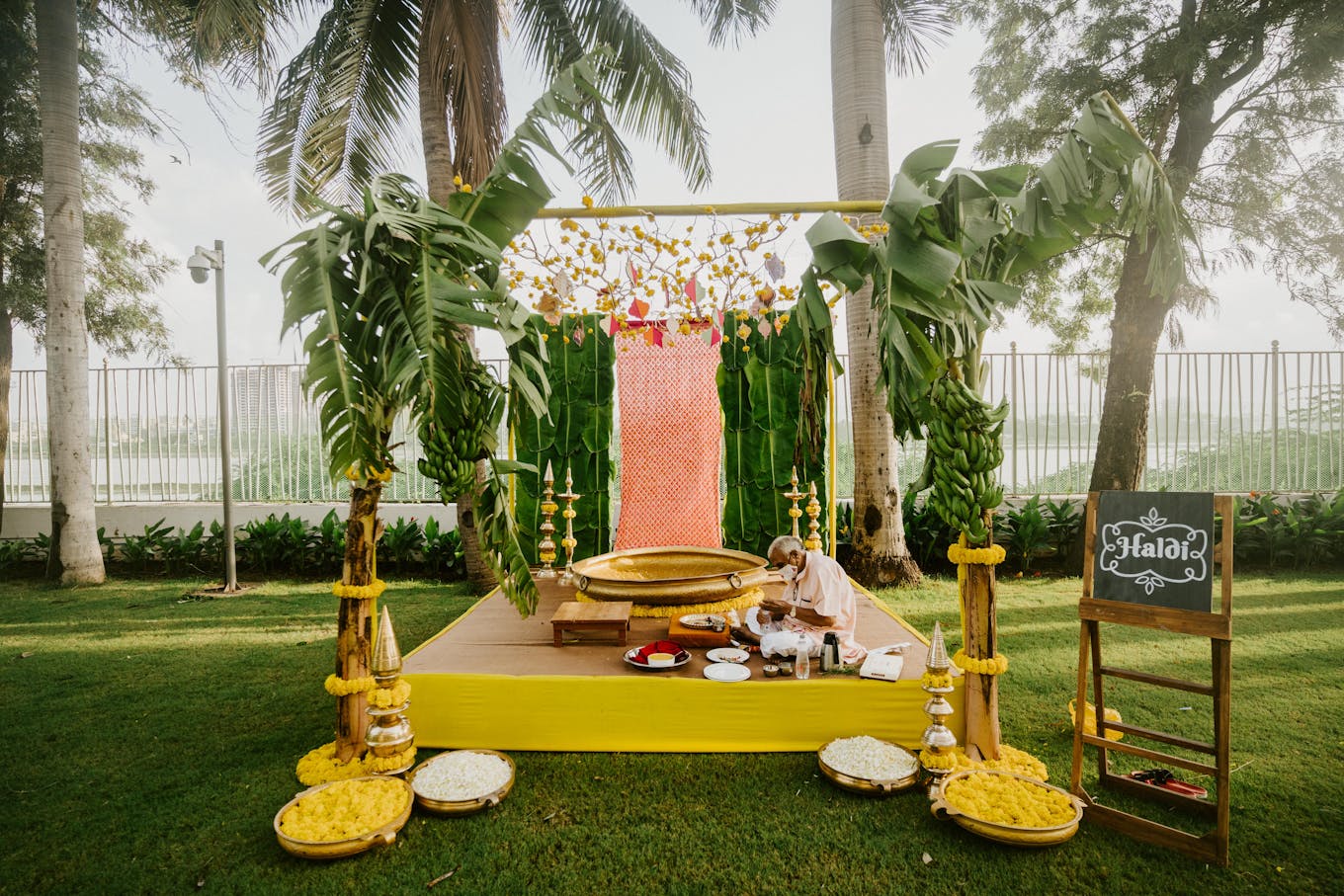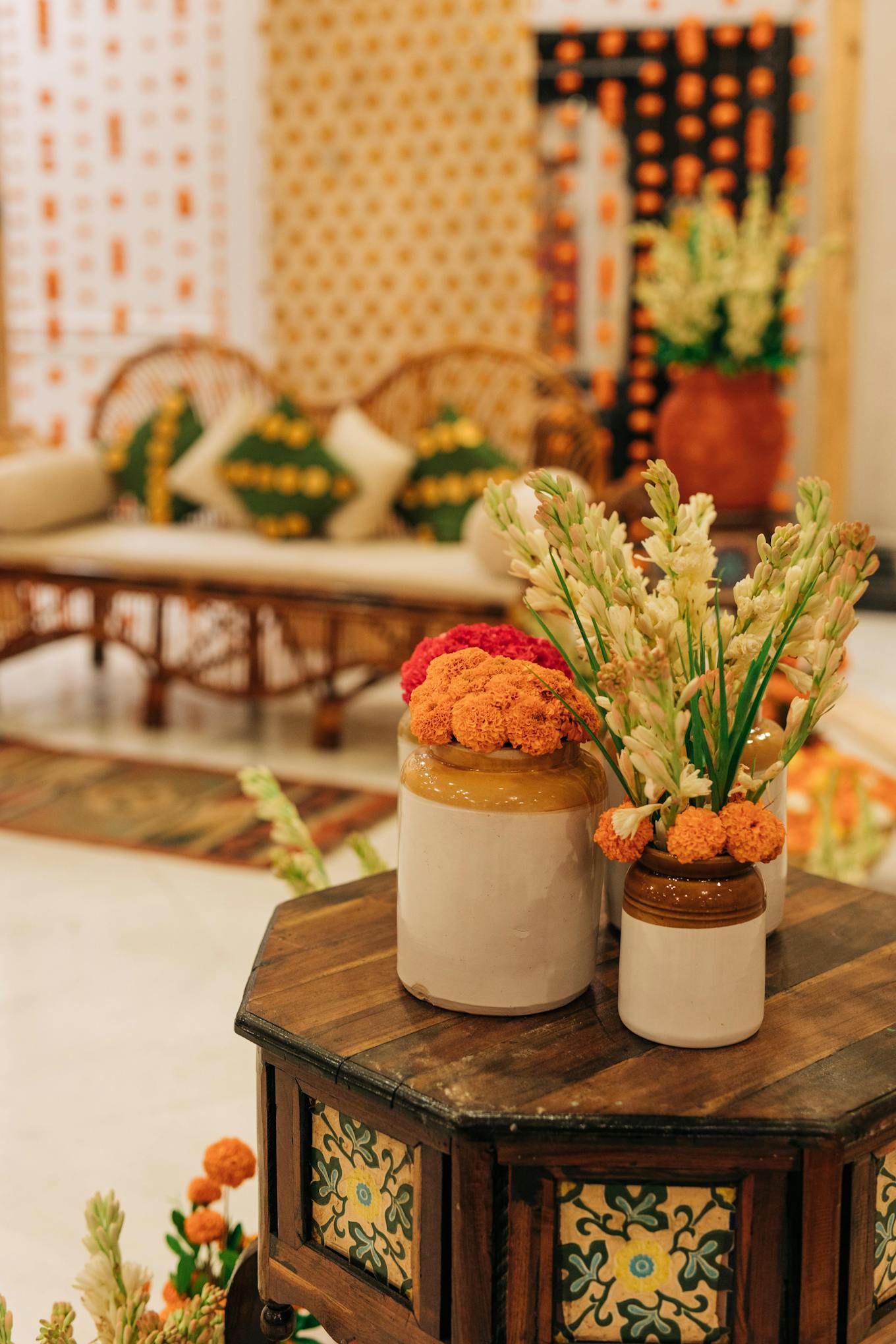Traditionally, well-off Indian families have taken the luxurious, opulent route when hosting weddings, but a new generation of environmentally-conscious couples are opting for a different way to celebrate their union.
To continue reading, subscribe to Eco‑Business.
There's something for everyone. We offer a range of subscription plans.
- Access our stories and receive our Insights Weekly newsletter with the free EB Member plan.
- Unlock unlimited access to our content and archive with EB Circle.
- Publish your content with EB Premium.
The lavish, three-day ceremonies, the extravagant decorations, the endless personalised gifts, and the smorgasbord of food options in over-the-top buffets no longer appeal to a new breed of young Indian urbanites who do not want their special day to cost the earth.
The appetite for eco-weddings is partly a result of growing environmental awareness among young people, and also the effect of the Covid-19 pandemic – lavish celebrations are considered wasteful. Where once it was not unheard of for a thousand guests to attend a ceremony in a deluxe farmhouse, now more families prefer close-knit, sober affairs that save on money, time, and resources.

More Indian weddings are going for the natural look. Image: Panigrahana weddings
As the idea of a sustainable wedding is taking hold, wedding planners and organisers who specialise in eco-friendly ceremonies have started to proliferate.
“Out of the 10 weddings we hosted in the past few months, two were eco-friendly. Sometimes the couples themselves want to be environmentally conscious while planning their weddings, sometimes we suggest it and they adopt the idea,’’ said Anuja Ravikumar, founder of Levitate, a wedding planner from Bengaluru in southern India, who specialises in plastic-free ceremonies.
Conceptualising a wedding that goes easy on nature requires meticulous planning — from the invitations, design, and décor, to the catering, gifting, and even wedding attire.
“We curated a wedding where we sourced old, worn-out tyres. The tyres were painted in five different colours, adorned with reusable flowers and used as decorative props. It made quite an impression on the wedding guests,’’ said Rahul D’Silva, events manager at Panigrahana Weddings, which is also based in Bengaluru.
Panigrahana Weddings’ eco-friendly option uses natural products like bamboo and jute instead of plastic; signages are hand-written on blackboards, which avoids wasting paper; and trees and shrubs are used to hang lights, rather than artificial structures.
The e-invitations inform guests that the venue is plastic free. Gifts for wedding guests include plants, edible food items, and products made out of recycled goods. Cane baskets and flowers for decoration are sourced locally. The ingredients for the food menu are usually sourced locally too, giving local farmers a boost. Leftover food is donated to local charities or NGOs. “We have a tie-up with an NGO to hand over leftover fresh food to be donated to old-age homes or orphanages. Food waste is collected and given to farmers to feed farm animals like cows or dogs. Nothing is left at the venue,’’ said D’Silva.

At a sustainable Indian wedding, trees and shrubs are used instead of artificial structures. Image: Nose to Tail Green Events
Another important factor is the wedding attire worn by the bride and groom. Instead of going to fancy showrooms and purchasing their wedding attire, couples opt to either rent or reuse wedding attire that has been in their family.
Wedding planners usually have to be very creative when planning a green wedding as they have to strike a careful balance between eco-friendliness and uniqueness. “Sustainable weddings basically involve finding eco-friendly alternatives in the various aspects of an event. Whether it’s decor, gifting and packaging, or invites, we use upcycled or natural materials. We also love to incorporate traditional Indian art and craft techniques as they mostly follow age-old sustainable practices,’’ said Aishwarya Lonial and Indraja Khare, co-founder and designer, respectively, at Nose to Tail Green Events, which specialises in curating eco weddings.
“
We are now planning to opt for a simpler, more natural wedding with a strong eco-friendly theme because we have new-found respect for life and our natural surroundings.
Avya Arora
Bengaluru-based Anchitha Akhilesh had a green, eco-friendly wedding in March 2022, and was happy with the way Panigrahana Weddings planned it. “I was particular that we did not want any wastage at our wedding. Our event planners used a lot of recycled items – throwaway items that they sourced from various places, which were painted, crafted, decorated, and used at the venue. Indian weddings generally use a lot of flowers, but we didn’t want to use too many fresh flowers as these end up being wasted by the end of the event. So, a lot of the flowers used for our décor were created from recycled items. They looked just like real flowers. For our wedding guests, everyone was gifted a seed bomb – a ball of mud with seeds that they had to go home and plant. These were given to every guest in a bag made of recycled fabric, such as from old saris, which we got made especially,’’ she said.
When it comes to the financial aspect, the cost of a green wedding is usually either comparable to or lower than that of a traditional wedding. “Weddings in India have a varied spectrum when it comes to expenses so it’s tough to compare. But financially, hosting an eco-friendly wedding is similar to a traditional wedding. There are areas where you would end up spending more to ensure sustainability, but at the same time there are other areas where you would save by avoiding unnecessary expenditure. So it balances out,’’ explained Lonial.

A sustainable wedding curated by Nose to Tail events used reuseable flowers. Image: Nose to Tail events
According to Ravikumar, green weddings entail recycling and reusing products, which proves a huge cost-saving measure. “For instance, we don’t use plastic water bottles but paper cups or even glass water bottles, which can be reused. Instead of confetti, we encourage the use of dried flower petals. These end up being financially prudent as well,’’ she said.
Usually, Indian weddings, particularly in northern India, feature elaborate events such as haldi, mehndi and cocktails, followed by a grand wedding ceremony and reception. Many planners concede that not every client is willing to go the green way completely. For instance, most families still prefer to stick to the conventional way of going to people’s homes to personally invite them with a fancy wedding card and a box of sweets.
In many families, a wedding in the family must be celebrated with opulence and grandeur just to maintain social status. Gifts are expensive and personalised. Lakhs are spent just on the decorations and the food, so the cost can add up to crores. “Sustainable weddings are a relatively new trend in India. However, in our last four years of being in the industry, we have noticed a steady growth in the number of people reaching out to us, which is a positive sign of people accepting this idea,’’ said Lohani.
The Covid pandemic has played a role in changing people’s minds about the way they wish to live, with many choosing simplicity and subtlety. “Covid changed the way we perceived celebrations and family events. The pandemic taught us that life can be celebrated with family, without all the fuss and splendour,’’ said Delhi resident Avya Arora, who is planning her wedding in 2023, “We are now planning to opt for a simpler, more natural wedding with a strong eco-friendly theme because we have new-found respect for life and our natural surroundings.”

















